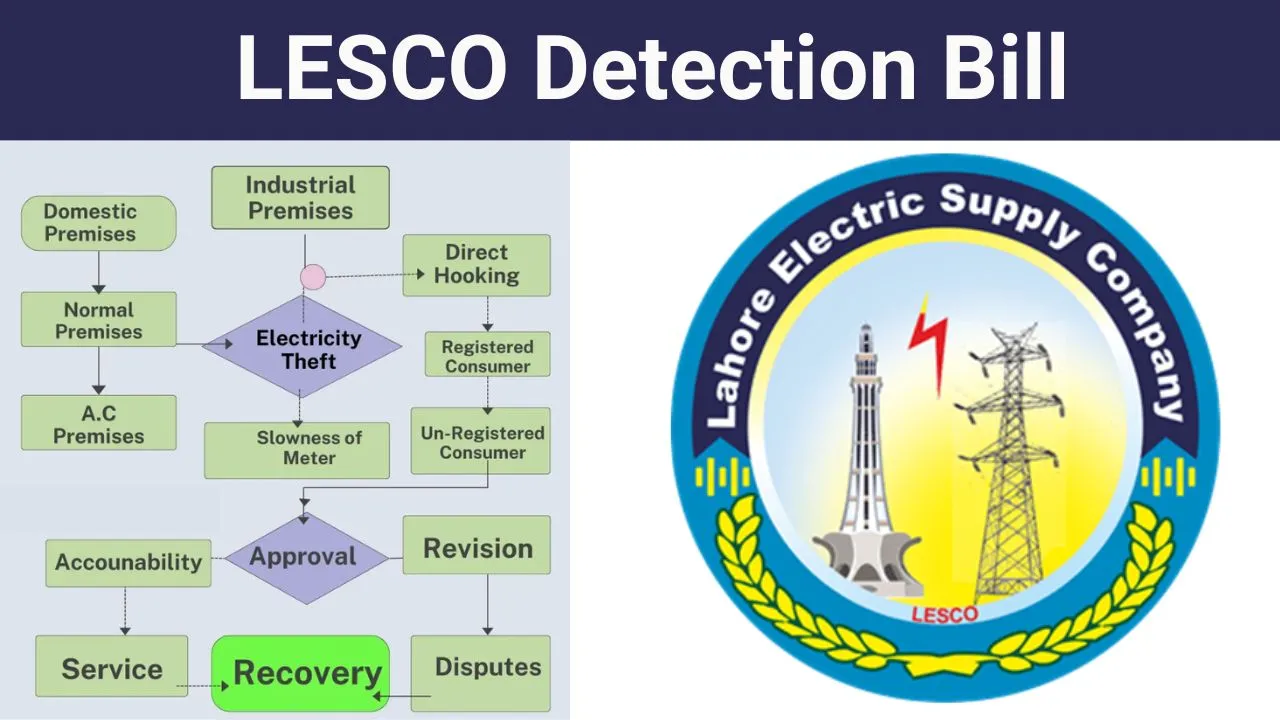The LESCO Detection Bill is a type of bill given to users who are caught engaging in illegal electricity use. These crimes may include power theft, tampering with the electrical meter, or making the meter run slowly. This amount is separate from your regular monthly electricity bill and is issued as a penalty for such behavior. It is critical to understand why you may receive a Detection Bill and how to respond if you do.
| Key Points About LESCO Detection Bill | Explanation |
| Reason for Issuance | Issued due to illegal activities like power theft. |
| Legal Basis | Based on the Electricity Act 1910. |
| Who Can Receive It | Registered and unregistered consumers involved in electricity theft. |
| Approval Process | Must be approved by a competent authority before being issued. |
Contents
What is a LESCO Detection Bill?
A LESCO Detection Bill is issued when a customer is discovered to be illegally using electricity. This can happen if someone steals electricity by connecting directly to the power lines, tampering with the meter to make it run slower, or if the meter has issues that cause lower-than-expected readings. LESCO (Lahore Electric Supply Company) uses this bill to recoup the costs of illegally used electricity. The amount charged on the Detection Bill is based on electricity consumption but is not properly documented.
How is a Detection Bill Issued?
Before issuing a Detection Bill, LESCO follows a legal process outlined in the Electricity Act of 1910. If LESCO detects electricity theft or meter manipulation, it conducts an investigation. If the investigation determines that criminal behavior took place, the consumer will be charged a Detection Bill. This bill is prepared using a certain form, and the consumer is notified before it is finalized. The notice invites the consumer to remark or challenge the results.
- Investigation: LESCO conducts an investigation to detect illegal activities.
- Notice: A notice is sent to the consumer before issuing the bill.
- Legal Process: The bill follows the legal guidelines set by the Electricity Act 1910.
Detection of Billing for Power Theft
Power theft is one of the most common reasons for receiving a Detection Bill. If a consumer is caught stealing electricity, LESCO will issue a Detection Bill to recover the costs. In cases where power theft is proven, LESCO will take legal action against the consumer under the Electricity Act. The consumer will be liable for paying the Detection Bill, which includes both the cost of stolen electricity and any additional penalties. To avoid further legal action, pay the bill by the deadline.
How LESCO Handles Slowness of Meters
A Detection Bill is generated when the electricity meter runs slower than usual. This could be due to technical issues or the user interfering with the meter. If LESCO discovers that the meter is slow, they will calculate the amount of electricity used based on consumption habits and the meter’s load. The consumer will subsequently be issued a Detection Bill for the discrepancy. If a sluggish meter is discovered within one or two billing cycles, LESCO will issue the bill as soon as possible after receiving approval from higher authorities.
- Technical Issues: Meters might run slow due to technical problems.
- Tampering: Consumers might tamper with meters to reduce readings.
- Billing: A Detection Bill is issued to recover the cost of electricity used.
Approval and Service of Detection Bills
Before being delivered to the consumer, a Detection Bill must be approved by an LESCO responsible body. Once accepted, the bill is delivered to the Revenue Officer, who distributes it to the customer. The bill is normally generated separately from the regular monthly charge, and customers are obligated to pay it within a certain timeframe. If a customer believes the charge is unfair, they can seek a review, and a committee will be formed to look into the case.
Also Read: How to Use the DHA LESCO Complaint Number for Efficient Service
Conclusion
The LESCO Detection Bill is an important instrument for the corporation in preventing and penalizing unauthorized electricity use. Whether it’s power theft, meter tampering, or technical faults that cause the meter to run slowly, this bill ensures that LESCO may recover the cost of electricity used but not billed. Consumers should be informed of the implications of unlawful activity and understand that LESCO goes through a rigorous legal process before issuing a Detection Bill.
FAQs
What is a Detection Bill?
A Detection Bill is issued when a consumer is found to be using electricity illegally, such as through power theft or tampering with the meter.
How is the amount in a Detection Bill calculated?
The amount is calculated based on the electricity that was consumed but not properly recorded, often using estimates based on previous usage.
Can I challenge a Detection Bill?
Yes, if you believe the bill is unfair, you can request a review, and a committee will investigate the matter.
What happens if I don’t pay the Detection Bill?
If you don’t pay the bill, LESCO may take legal action, including disconnecting your electricity supply.

